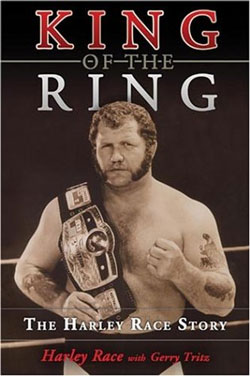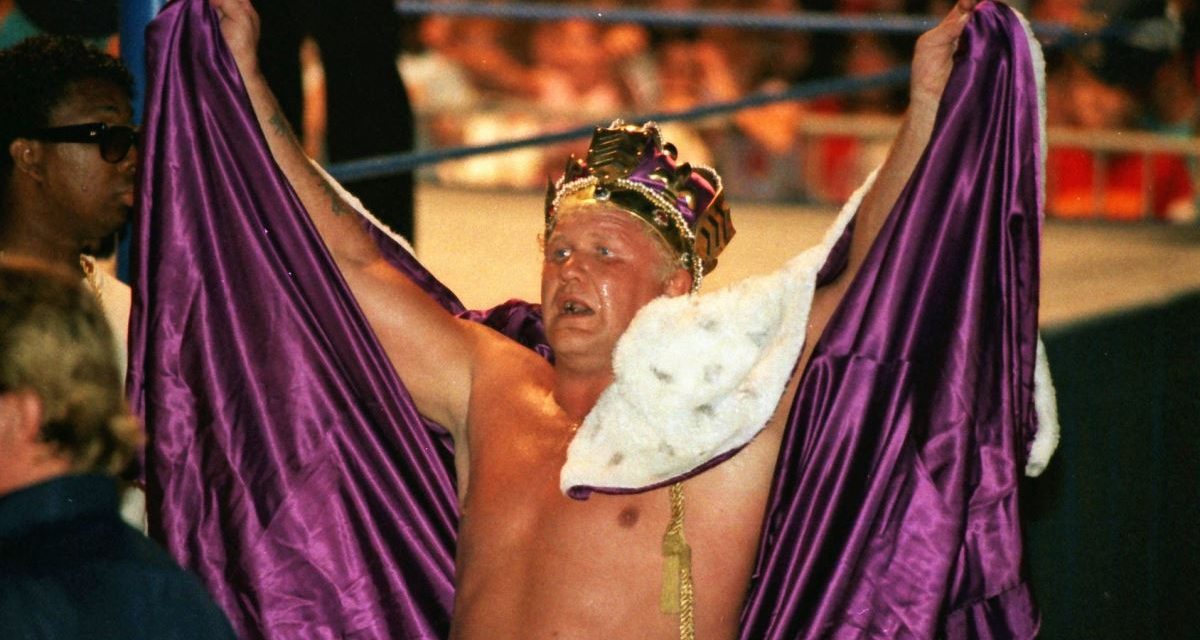The stories of Harley Race’s exploits, particularly behind the wheel or with a gun, are common fodder at old-school bull sessions. Yet, readers of King Of The Ring: The Harley Race Story, won’t find bawdy tales of excess and foolishness on the road. It’s very much a PG book on purpose.
“I made it more of a PG-type book than the rest of them that are out there,” Race told SLAM! Wrestling from his wrestling school in Missouri. “And the reason for that is I’m right here in Eldon and our slogan in World League Wrestling is ‘Shut up and wrestle.’ All of our shows are clean shows. I don’t allow any swearing, I don’t allow any of the low blow crap, or any of the nudity-type thing that you see. Ours is what wrestling used to be. It’s wrestling, it’s not all the showboating and crap that you see now.”

Race’s co-writer, Gerry Tritz, said the plan was there all along to make it a book accessible to anyone. “That was his intent from the beginning, to make it more of a PG than an R book,” Tritz said. “I think sometimes that’s a little inconsistent with the lifestyle that he’s led. We did touch on some of those aspects. I think we tried to convey the lifestyle he led without using vulgarities and stuff like that.”
In career that started when he was just 15, there are lots of stories to tell for Harley Race – his successes as a tag team partner to Larry Hennig in the AWA, trips to Japan, various booking positions, his stint in the WWF as “The King, and managing in WCW. But time and time again, fans want to know about the eight NWA World championship reigns, from 1974 to 1983 – a period when the world title meant something.
“During the time that I was champion — and this is legit — I probably wrestled 400 times a year,” said Race. “I don’t want to sound like I’m blowing smoke up my own rear end, [but] the NWA people legitimately had 26 territories to go to in the United States and Canada, plus all the overseas stuff that was recognized by the NWA. So their champion legitimately had a chance to travel virtually the whole globe.”Like Race’s old travel schedule, there was lots of ground to cover for Tritz, who has a full-time gig as the Sunday editor at the Jefferson City News Tribune in Missouri. He found Race to be open and accommodating with the ups and downs of his life.
“I always knew that he had led a rough life, but I don’t think I was fully aware of all the pain that he’s been through in his life. I mean, the highs and lows of his life are a lot of different than the highs and lows I think of a normal person’s life,” said Tritz, 37. “He’s had just some incredibly painful experiences, like the death of his first wife in the automobile wreck, and some soaring highs, being the world champion for so long.”
In the 1970s, Race had actually started down the path towards a book on his career with Kansas City Star writer J.J. Maloney, who was a celebrated figure in town for essentially using his writing skills to make a career from prison. Maloney had met and written about Race, and over the years had worked off and on at the story of Race’s life. “He had started to write my book off those two articles that he had in the newspaper. But he got cancer and he passed away [in 1999]. So then I just put the thing on hold for quite a while.”
The late ’90s wrestling publishing blip brought it back to life. “When [Mick] Foley came out with his book, that kind of reminded me of it,” said Race. “Then all of a sudden, everybody was doing a book, including Chyna, who had been in the business about three weeks. Again, I kind of just put it on hold.”
Illinois-based Sports Publishing was shopping for wrestling books after succeeding with the second Bobby Heenan book, and approached Race. “The King” considered a few friends in Kansas City before asking Tritz, who lived much closer.
“A lot of people ask, ‘How did you choose Harley as your subject?’ Well, I didn’t choose him, he chose me. I just got lucky, basically. I think the proximity of me being 30 miles away helped because I was able to, on my days off, just drive down to interview him,” laughed Tritz. The writer visited his subject a couple of times a week, from February to August 2004, sitting in Harley’s office with his laptop and a tape recorder. The unhurried, deliberate pace of Race’s diction made taking notes a reporter’s dream.While he never kept a diary on the road, Race did have his booking sheets. “Since I left in Minneapolis in the late ’60s, I’d been involved in the booking side of wrestling, starting with Dory Funk Sr. in Amarillo, Texas. So I still have those books. I’ve got them here in my desk. They go back to the late ’70s through the ’80s when I hooked up with Vince [McMahon]. So I just sort of thumbed through those. I could see matches that I had 20 years ago.”
Race explained his part of the process. “He would do it a chapter at a time, then I would re-read it, and say a yea or a nay. We kind of just went over it and over it and over it until we found up with what we got. However, what we got, there’s two or three chapters that didn’t make it into the book. I think the reason that they didn’t was they were in a real rush to get it out for the Christmas season.”
The book deadline wasn’t the only thing on Tritz’s mind as he raced to get the book – his first – to the publisher. “This project ended in perfect time. I think I turned in the final manuscript in October, and that’s when my first child was born. My wife Debbie and I just had a baby October 24, Jacob. If the process of the book had gone on any longer, there would have been problems. It worked out perfectly.”
RELATED LINK

